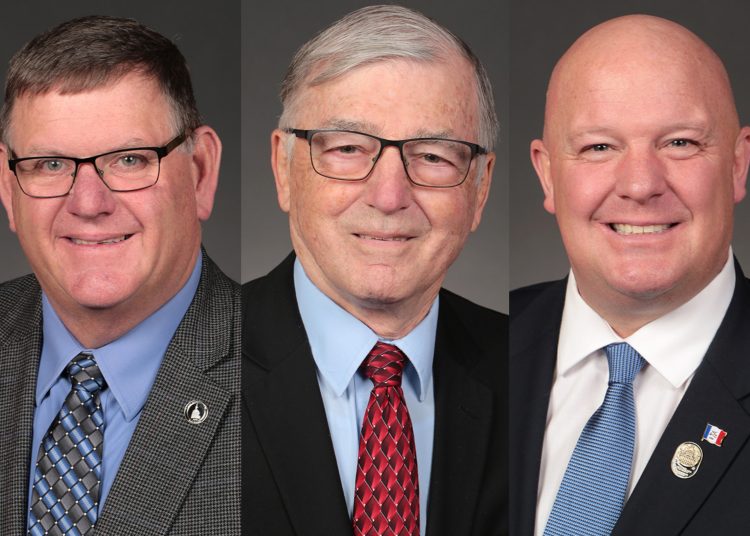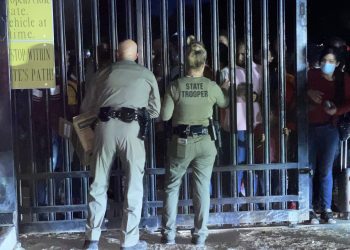DES MOINES, Iowa – SF 84, a bill that requires Iowa’s businesses to use E-Verify to ensure they don’t hire illegal immigrants who are not eligible to work, passed out of an Iowa Senate subcommittee.
The bill provides several enforcement mechanisms and penalties, including a business having its licenses permanently revoked if it has a second offense.
State Senators Julian Garrett, R-Indianola, Kevin Kinney, D-Oxford, and Jason Schultz, R-Schleswig, made up the committee. Garrett and Schultz approved the bill, while Kinney opposed it.
During public comment, all who spoke during the subcommittee hearing opposed the bill. No public comments were available online.
Brad Hartkopf, the public policy director for the Iowa Association of Businesses and Industry, opposed the bill. “We don’t look at this as an immigration issue. This bill we really see it as a through the lens of business as being a mandate imposed on businesses,” he said.
“There is no state contiguous to Iowa that has a blanket mandate for private sector use e-verify. I think Nebraska and Missouri require it for some private employers who utilize tax incentives, but all the states that have a blanket mandate are confined to the deep south or some states in the West, including Arizona and Utah,” Hartkopf stated.
He added they want to see the federal government address this and put every state on a level playing field.
Tom Chapman, executive director of the Iowa Catholic Conference, said they do not oppose E-Verify but believe federal government issues should be left to the federal government.
Dustin Miller representing the Greater Des Moines Partnership and Iowa Chamber Alliance, also opposed the bill.
“The E-Verify system has a lot of challenges that (are) flawed enough it’s really worrisome that the mandate on business could lead to penalties for employers,” he said.
Miller was also concerned about the penalties the bill offers.
Ericka Johnson, representing the Iowa chapter of the American Friends Service Committee, also opposed this bill.
“What this seems like is an attempt to, you know, rather than actually working to push the federal leaders to reform our immigration system in a way that benefits our economy, and treats immigrants and refugee workers with the dignity and respect they deserve, it’s a divisive anti-immigrant proposal that will end up harming minority communities in Iowa,” she said.
Representatives from the Iowa Conference of the United Methodist Church, Iowa Coalition Against Domestic Violence, Iowa Federation of Labor, United Electrical Workers, and Laura Chesser, an immigration attorney, also spoke out against the bill.
State Senator Kinney said that he opposed the bill and would not sign-on the legislation because he did not believe it was accurate enough. He cited reports from the ACLU and the Cato Institute. He said he supported similar legislation in the past but noted that illegal immigrants sometimes purchase a social security number from someone who has died. He said if there is no further checking, that person would pass. Kinney was also concerned about people who are flagged incorrectly.
“There’s a lot of individuals that if they are flagged there’s not the mechanism within E-Verify to correct that wrong hit,” he said.
Kinney suggested fingerprinting everyone. “Everybody’s fingerprints are their own. There are no other fingerprints out there. So if there is a question, they can just go and run the fingerprints,” he concluded.
State Senator Schultz said he sees the bill as a way to level the playing field in Iowa as some businesses use E-Verify and others, he noted, “flout the law.”
“They’re getting away with a competitive advantage that they should not have. I’d like to see the playing field level between employers,” he said.
Schultz supported Iowa helping enforce immigration law.
“It is up to it is up to the states to decide whether or not they want to nullify federal law by ignoring it, or if it is something in the best interest of the state to go ahead and help enforce it. Some areas, I believe we should just let the feds take care of their own business. This is one that I think going back to leveling the playing field and making sure that everybody is operating in a similar manner benefits the state, from river to river,” he stated.
State Senator Garrett said E-Verify is straightforward to use.
“I have talked to a number of Iowa employers who use E-Verify. As I mentioned, there are over 5000 of them, every single one of them that I’ve talked to has said it’s very simple to use. It’s just one additional step added on to things they already have to do,” he said.
Garrett added that it is tougher to get around the system. It requires a picture ID (driver’s license, state-issued ID, passport, etc.) and a second form of identification like a social security card.
He also said this is an issue of fairness.
“I have always felt that allowing people to hire people in the country illegally in violation of federal law is unfair to almost everybody else. It’s unfair to other businesses who obey the law and have to compete with other with their competitors who are cutting their costs by hiring people who will work for substandard wages. That’s unfair. If you are a person looking for a job, and you have to compete with people who will work for substandard wages, that’s also unfair,” Garrett said.
He also pointed out a shift in how the Biden Administration will handle immigration law enforcement compared to the Trump administration.
“It appears that the new administration is going to drastically open up the borders in comparison to what we’ve had. So if we do nothing, we’re probably very likely going to see an influx of new people coming in who are not here legally,” Garrett explained.
SF 84 will go to the Iowa Senate Judiciary Committee for a vote.
Listen to the full subcommittee hearing below:
















